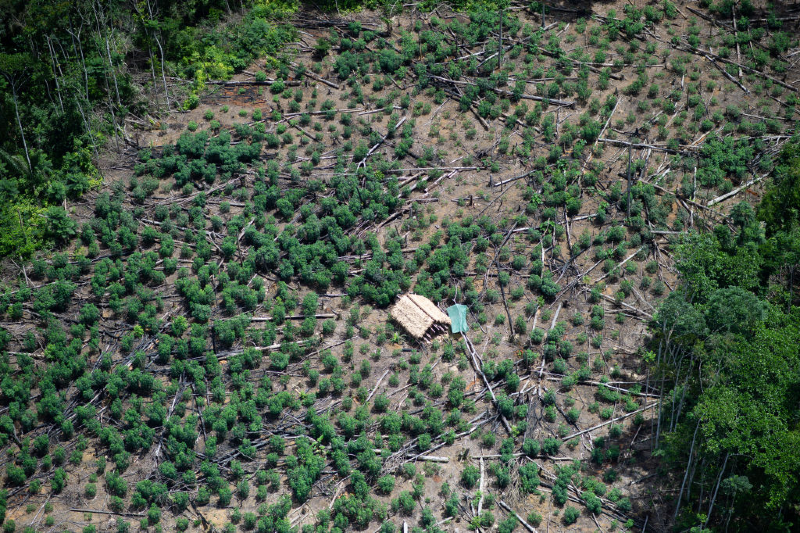Extract from Eureka Street
- Bree Alexander
- 06 August 2020
It was in July last year that a thick blanket of smoke covered vast areas of the Brazilian Amazon, images of which went viral on social media and saw us symbolically gasp for air on a global scale. INEP, Brazil’s national space agency identified 6,800 fires in the Amazon region as of July 2020, almost 1,500 more than last July. While it may not provide the same visual effects, deforestation, a practice which has become rife in the region has equally grave consequences for the planet and life on it. During the first six months of this year an area of Brazilian Amazon forest 25 per cent larger than during the same time period last year was destroyed.

As well as this gravely concerning destruction that remains on the rise while the world is largely focused on COVID-19, a recent report from Global Witness revealed that murders of land and environmental defenders, defined as people who take a stand for land and environment in a peaceful manner, reached a high in 2019.
The report named 212 people, the highest deaths by country being from Colombia, The Philippines, Brazil and Mexico. Over half took place in Colombia and The Philippines and this figure is no doubt an underestimate due to the underreporting of deaths, including increasing limits of the press globally and challenges associated with access to conflict zones as well as limited information from the African continent. It is a reminder that those who are on the frontline, who are disproportionately Indigenous peoples, are facing threats, violence and death in defending their rights to land and water, the ecosystems we all depend on for survival. The report too found that logging is up 85 per cent since 2019.
A concerning trend linked to limiting the rights of environmental defenders which has been seen across countries including Iran, France, Kenya and Poland, as well as the UK and Australia, is labelling them and their actions as terrorism, ecoterrorism, or threats to national security and using such security laws to detain, blacklist and limit movements of people.
In the Philippines, the Anti-Terrorism Act 2020 that was passed in June is an example of the concept of terrorism being loosely defined, with concerns that it will curtail rights and be used against environmental defenders who have already been heavily targeted, such as the suspension of Indigenous schools for alleged national security risks.
Further, governments have not hesitated to seize the moment of COVID-19 domination to roll back environmental protections often to facilitate fossil fuel projects, a trend that the UN has labeled ‘irrational and irresponsible’. Examples include the go ahead for gas exploration in Victoria and the removal of public participation in decision-making processes in Canada including the opening of the eastern Rocky Mountains and foothills for coal-pit mining. In the USA, 100 environmental protection rules have reportedly been reversed.
'It is those on the frontline who remain at grave risk, without adequate or any support from public or private institutions, yet whose daily acts we all depend on.'
The Global Witness report revealed that while it is difficult to identify perpetrators due to corruption and widespread impunity, 37 of the murders could be linked to state forces. With the global trend of close ties between governments and corporations who have benefited from environmental degradation, it is no wonder that it is private companies and investors who are gaining traction in the case against deforestation and slowing climate change.
In the case of Brazil, President Jai Bolsonaro has come under scrutiny over failures to protect the environment and recently introduced regulations to that effect. However, with the defunding of Brazil’s peak environmental body leading to limited resources for enforcement on the ground, implementation remains elusive.
It is therefore those on the frontline who remain at grave risk, without adequate or any support from public or private institutions, yet whose daily acts we all depend on. The decoupling of corporate and government interests may seem like an impossibility. We may feel further from other continents than ever before, yet if we move our focus away even briefly from our own lungs to forest regions such as the Amazon which Stuart Basden refers to as our collective lungs, it may remind us why change is imminent and why we must not lose sight of the bigger picture.
While it may seem easy to despair in the face of such global issues, the smallest acts are still within our control. The absence of transparency in supply chains highlights the importance of eating locally and paying attention to where our food and other goods come from. We can remind ourselves that deforestation and logging are demand-driven, resulting in cleared land for meat and agricultural production. It is also an opportune moment to express solidarity with these grassroots struggles and support them in whichever way we can.
No comments:
Post a Comment